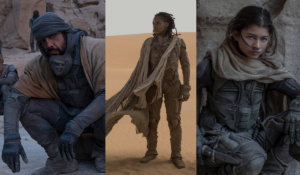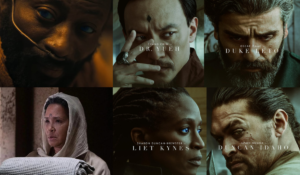'Love, Victor' Season 3 Review: Disney+ Means More Disney Fluff
This Pride month, Hulu’s 'Love, Victor' comes to a close with its third and final season—it’s most complicated yet sweetest season yet.


Dune (2021) is disappointing in more ways than one. Yes, it has stunning visuals, a striking soundtrack, and fantastic performances all around. But it has issues across the board, from its pacing, to its story, to its diverse representation. Spoilers ahead.
Dune should have been a HBO Max show. There, I said it. I sat waiting for two hours and thirty-five minutes for this movie to get started, only for it to feel like it was finally picking up once Chani said, “This is only the beginning.” And she was right: the final scene is only the beginning, and that’s the problem. This movie is incomplete. Honestly, it feels like less than a major part of a story: it’s merely the inciting incident, told over two hours at a slow pace that would have been better suited to television.

Dune should have been an HBO Max show with a weekly release. This movie feels like the longest pilot episode ever to the beginning of a franchise we won’t even get the next installment in for another two years! Had Dune been a TV show, it would have been able to flesh out each character as well as the world in a medium better suited for in-depth worldbuilding and character development. Each part would have felt like a piece of a larger cohesive hole, with each episode answering questions asked in the previous episode. But instead, the Dune franchise is being told through movies. Movies are supposed to be singular cohesive units. Some have been able to bend the rules, like Marvel, which manages to give each of their movies a single story with one overarching narrative that can typically stand on its own while simultaneously getting audiences excited for the next film. It’s a success seemingly irreplicable by any other studio or franchise, including Dune. Instead of leaving me excited for the next installment, I finished Dune feeling disappointed and empty because of a mix of things: the slow pace, the heavy exposition, the lack of significant movement forward in the story, the lack of an emotional payoff in the end, and the problems with sensitive diverse representation in the story.
One of the integral components of the novel Dune is its Islamic influences. Author Frank Herbert did extensive research and used Islam as the basis for many of the story’s roots. The book uses many Arabic words and phrases important to the Islam religion. So, in the movie, the Fremen speak an Arabic-derived language and share many traits with peoples from SWANA (South West Asian/North African) cultures. The Fremen are an indigenous people populating a desert planet, which has the same landscape as North Africa. The Fremen have striking similarities to real groups, like the Bedouins—a nomadic Arab tribe in North Africa—and the indigenous group the Amazigh, who aren’t even Arab but who are indigenous to North Africa. The problem is that while the Fremen are clearly inspired by these groups, they are not represented by actors of these cultures. Instead, the Fremen are portrayed as vaguely POC, made up of actors who aren’t even Muslim or of SWANA origin. Background actors may possibly be accurate casting, but these are background characters without any speaking roles who appear for less than ten minutes in the entire movie.

The true “faces” of the Fremen include Javier Bardem as the leader Stilgar, Zendaya as Chani, and Sharon Duncan-Brewster as Dr. Liet Kynes. Javier Bardem is Hispanic, Zendaya is a mixed Black woman, and Sharon Duncan-Brewster is also Black. But none of them are Muslim or directly from North Africa besides actor Babs Olusanmokun who plays Jamis, the Fremen warrior Paul kills only a few minutes after meeting him. Dr. Liet Kynes dies in this movie too, while Stilgar and Chani have under ten minutes of screentime. Even if the latter two have more screentime in the next movie, again, they aren’t even Muslim or of SWANA origin. It’s 2021: if you’re going to take aspects from a real culture and include it in your fictional world, the least you can do is represent those people when telling a story based on their experiences.
Moreover, there is an inherent problem in the portrayal of the Fremen beyond the casting: they need Paul’s help to rise against their oppressors. They need a white savior (expanded on below). And (spoiler alert for the later books): once they rise up and claim power, they take on an uncontrollable religious zeal that expands beyond Paul and turns them into a violent force, spreading a holy war across the universe. If that sounds Orientalist to you, you’re right. Herbert portrays the Fremen as a dangerous religious force because he subconsciously centers his white, Western perspective and perpetuates Orientalist stereotypes.
The most glaring problem with Dune is its white savior narrative. Yes, readers will say that this is purposeful because Herbert was trying to deconstruct this trope and look at the white savior narrative through the lens of white guilt. They will say the future movies, like the books, will reveal this. But that is precisely the issue. We won’t see the sequel until 2023, so we’re left with the white narrative the film builds and no clear deeper justification for it. Even when the future sequel(s) come out, the book’s “justification” for this white savior story is supposedly to deconstruct it by showing that Paul is not a perfect messiah when he unleashes the violent holy war previously mentioned. This is an extremely problematic narrative as previously explained because it makes the Fremen nothing more than brutal crusaders. But the issue at the heart of this is ultimately, Herbert’s books and Villeneuve’s film both center the white perspective above all else. They give Paul, a white man, agency over all others via his power as the heir to House Atreides and his literal psychic powers.
Paul comes to the Fremen and becomes their leader. The Fremen apparently cannot rise up against their oppressors without the help of another “benevolent” white colonizer. This would have been a much more powerful narrative if the Fremen rose up against the Harkonnens and the emperor on their own, but they need a “messiah” to save them, and that messiah has to be a white man, according to Herbert.

The movie’s casting of POC actors in supporting roles is also an issue. Oscar Isaac plays Paul’s father, Duke Leto Atreides. Isaac happens to be Hispanic, the one member of the Atreides family who is not simply white, and he dies. He is just the beginning of a pattern. The Fremen housekeeper Shadout Mapes, played by mixed Black actress Golda Rosheuvel, is killed shortly after her introduction. Dr. Yueh, played by Taiwanese actor Chang Chen, is killed by Baron Harkonnen shortly after betraying the Duke in a predictably doomed effort to save his wife. Thufir Hawat, the Atreides computer-like “Master of Assassins,” is portrayed as little more than a human version of Siri and disappears quickly. He is played by Black actor Stephen McKinley Henderson. Dr. Liet Kynes is also Black, a member of the Fremen, and gender-bent for the movie. But that “gesture” of gender-bending feels empty once she is unceremoniously killed by the emperor’s warriors after helping Paul. Duncan Idaho is killed protecting Paul and his mother. He is played by Jason Momoa, a Pacific Islander. Finally, Jamis is the Fremen warrior Paul kills to be allowed into the tribe. Jamis happens to be the only dark-skinned Black member of the Fremen with a speaking role in the movie, and he is played by the only actor from Africa (Nigeria, specifically). Paul Atreides killing a dark-skinned Black man to get into a tribe of POC with the goal of leading them simply does not sit right with me. There is a pattern here.
Whether you like it or not, Villeneuve centers the two most prominently white characters of the story: Paul Atreides and Lady Jessica. What’s worse: Paul is literally a product of eugenics, a concept rooted in racism. And he is the center of the story. Herbert imagines the ultimate product of the Bene Gesserit breeding program as a cishet, white man who dominates indigenous peoples and creates an empire across time and space. That is an issue. Because Herbert, Villeneuve, and movies like Dune cannot imagine messiahs and those in power as POC, women, and minorities in general, the white savior narrative will always be a problem.
Related lists created by the same author
This Pride month, Hulu’s 'Love, Victor' comes to a close with its third and final season—it’s most complicated yet sweetest season yet.
Related diversity category
We sat down with Writer/Director Albert Acosta to discuss his debut short film, (ha-ha), Acosta's foray into narrative cinema, and how his personal experiences have shaped his filmmaking philosophy.
Related Movie / TV / List / Topic
A chilling return to the Final Destination franchise with a terrifying twist on fate. Bloodlines explores whether Death can hold a grudge across generations—and what happens when the past won't stay buried.